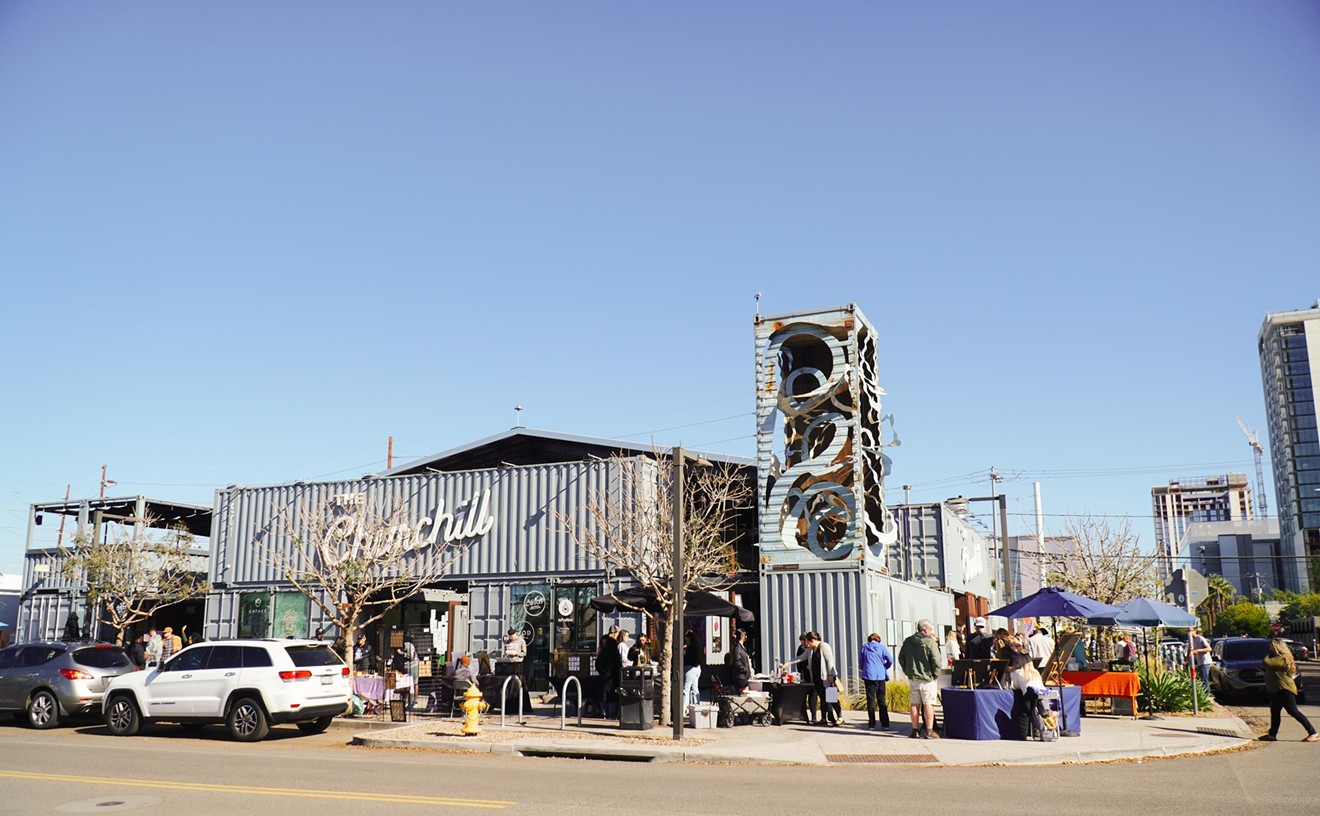The view shifts slowly as the outer rim of the dining room grinds clockwise, and Greenhorn smiles. This view, you see, is another notch in his belt. Greenhorn, a Scottish-born playwright and TV writer with a growing reputation in Europe, collects revolving restaurants. He's been to more than half a dozen, in four countries across three continents in three hemispheres.
He's just come from visiting Seattle -- where his play The Salt Wind was produced two years ago -- to eat in the revolving restaurant there. On his way home to London, he's swung through Phoenix to visit friends. And, of course, to eat in the revolving restaurant here.
"It's just a fetish," he explains. A fetish that was frustrated on his earlier visit to the States. "When I was in Seattle before," he says, "I arranged to have lunch with this actress in the Space Needle, but they'd closed the restaurant. So that's why I had to get back to Seattle, to fulfill that lunch date. They'd renovated the restaurant, so it was probably a lot nicer. The food was a bit pricey, but the view was fantastic."
While in the Pacific Northwest, he also took a side trip to Vancouver. "They have two in Vancouver, one good one, one not so great. The one in a hotel is not brilliant, mainly due to the food and the service, but the one down by the harbor is good on both counts, and the view is stunning."
Our reasonably stunning view is to the north as we order. Central Avenue, Westward Ho! and the Burton Barr Library are on our left; directly below us is the Arizona Republic building and the Herberger; off in the distance to the far right is the Biltmore; and beyond that is Squaw Peak to the north and Camelback Mountain to the east. As we edge farther south, I point out the Mercado and tell something of its history, and am surprised when he knows who Fife Symington is.
"I'm a news junkie," he says.
I also point out to Greenhorn that, development aside, this is the skyline one sees at the beginning of Hitchcock's Psycho. Though Greenhorn is a reserved man, earnest and extremely soft-spoken, I can see that this tickles him, the way that only a foreigner can be tickled by pop Americana.
Our appetizer of Dungeness crab cakes arrives, and as we eat, Greenhorn tells me about his fetish for revolving meals. It began about four years ago, in, of all improbable places, East Berlin.
"A production of a play of mine was on there," Greenhorn explains. "I was left to my devices to wander about. This was after the Wall was down. So I was walking around looking at all these historical points, Checkpoint Charlie and all these things. And I saw this TV tower, and there was a revolving restaurant in it! And I remembered that as a kid, the height of glamour and sophistication that I aspired to was revolving restaurants, kind of a Roger Moore/Tony Curtis, late-'60s/early-'70s 'Swinging London' feel to it. So I went up to this revolving restaurant, and because it was East Berlin, the decor was exactly that. It was just so retro, except it wasn't retro; it was just what they had."
After this grimly mid-European introduction to circuitous midair dining, Greenhorn was all the more blown away by his second revolving-restaurant experience. "Later that same year, I went off to Australia for Christmas, and discovered Sydney has two revolving restaurants, and I went up both of them. One of them was fine, it was like the TV thing in East Berlin, and the other one was just the most fantastic restaurant I've ever been in. We were there Christmas Eve, and lunch lasted four hours. And when you revolved, what you were looking at was Sydney Harbor Bridge, Sydney Opera House, the city. Just an astonishing sight."
The appeal in all this, as Greenhorn frankly admits, is of the if-they-could-see-me-now variety. "I think it's due to the fact that I grew up in this small mining village, and I am very unsophisticated, so that every time I've been sitting, eating at one of these restaurants, I think, 'I can't believe I'm actually in this place.'" This was especially true in Sydney. "I had a posh bit of TV money at that time, and went off with my girlfriend, and it was like, 'Here you are on the other side of the world in all this glorious sunshine, eating fantastic food.'"
It hatched in him an idea for a book, one he'd better hurry up and write before somebody (like, say, me) rips it off: "Wouldn't it be a great excuse to travel around the world and eat at revolving restaurants?" he understates. "I was thinking of creating a character who was writing a book about it, and use it that way."
He also has a Martha Stewart-ish notion for a wedding reception in a revolving restaurant "with the top table on the inner bit that doesn't revolve, so the whole rest of the party goes 'round, and the top table gets to converse with every single person at the party, instead of that whole thing with the bride and groom at the head table, and if you're at the back, you just wave at them."
We're looking south now -- at BOB and America West Arena and at the little patch of days-are-numbered slummy buildings at the western end of the Purple Palace. Our lunches arrive, a peppery ahi tuna sandwich for me and grilled chicken for Greenhorn. As we dig in, our talk turns to more general subjects. He is, indeed, a news junkie, and very up on American politics, particularly on the presidential debacle in Florida. He startles me by wondering aloud whether perhaps it would be better if Europeans could vote in American elections. I wonder how this idea would go over on either side of the Atlantic.
He also tells me how he happened to end up studying drama. "I was at university, the first time, to be an astronaut. Took physics, left by mutual consent. Went back to another university to get an honors degree in English, but the first year realized that I didn't want to spend all my career reading Jane Austen; life's too short. But I realized you could read Arthur Miller in an afternoon."
By his third year, he wrote a student play that won an award, and by the time he was out of school, he says, "I was too old to train. I applied for a job as a petrol pump attendant and they wouldn't employ me 'cause I was 'too literate.'" He decided he had no alternative but to pursue his writing seriously. Since then, he's gained notice for The Salt Wind, which he describes as "a tragedy set in a fishing village, very Greek, lots of inevitability, so I got that out of my system," and for his road comedy Passing Places. He's also written for both the radio and TV sides of the BBC.
We've been at the Compass more than an hour -- one revolution takes 55 minutes, and we're past where we started. It's time for me to leave, but Greenhorn says he's going to stay awhile, and orders another glass of wine. I leave him there, staring out at the Valley, sipping contentedly.
Ah, research.










